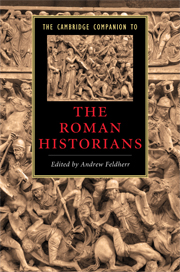Book contents
- Frontmatter
- Introduction
- Part I Approaches
- Part II Contexts and Traditions
- Part III Subjects
- Part IV Modes
- Part V Characters
- 15 Characterization and complexity: Caesar, Sallust, and Livy
- 16 Representing the emperor
- 17 Women in Roman historiography
- 18 Barbarians I: Quintus Curtius’ and other Roman historians’ reception of Alexander
- 19 Barbarians II: Tacitus’ Jews
- Part IV Transformations
- Chronological list of the historians of Rome
- Bibliography
- Index
16 - Representing the emperor
from Part V - Characters
Published online by Cambridge University Press: 28 November 2010
- Frontmatter
- Introduction
- Part I Approaches
- Part II Contexts and Traditions
- Part III Subjects
- Part IV Modes
- Part V Characters
- 15 Characterization and complexity: Caesar, Sallust, and Livy
- 16 Representing the emperor
- 17 Women in Roman historiography
- 18 Barbarians I: Quintus Curtius’ and other Roman historians’ reception of Alexander
- 19 Barbarians II: Tacitus’ Jews
- Part IV Transformations
- Chronological list of the historians of Rome
- Bibliography
- Index
Summary
Roman historians rarely have more fun than when representing the emperor. Emperors are not like the rest of Rome's population. Primus inter pares or “first among equals” they may be, but they are still first in authority or princeps. They are also candidates for deification. For their primacy to be recognized, they must appear exceptional (eximius), different from the senators, in tune with them, but “super-human.” This is a delicate balance at the best of times. In public, there were stock devices to separate them from the masses: dress, props, entourage and so on, not to mention the circulation of their names and portraits on coins, in marble and other media, the frequency of which turned them from private citizen to public commodity. But an emperor had to look like an emperor “on the page” as well as in public - had to act, think, and sleep like an emperor. The need for him to be extraordinary in any given narrative afforded authors like Tacitus and Suetonius numerous opportunities for exaggeration. His public displays of office could be turned on their head so that what was destined to spell distinction could - in the writing of a reign - make an emperor sub-human.
- Type
- Chapter
- Information
- The Cambridge Companion to the Roman Historians , pp. 261 - 275Publisher: Cambridge University PressPrint publication year: 2009
- 2
- Cited by

